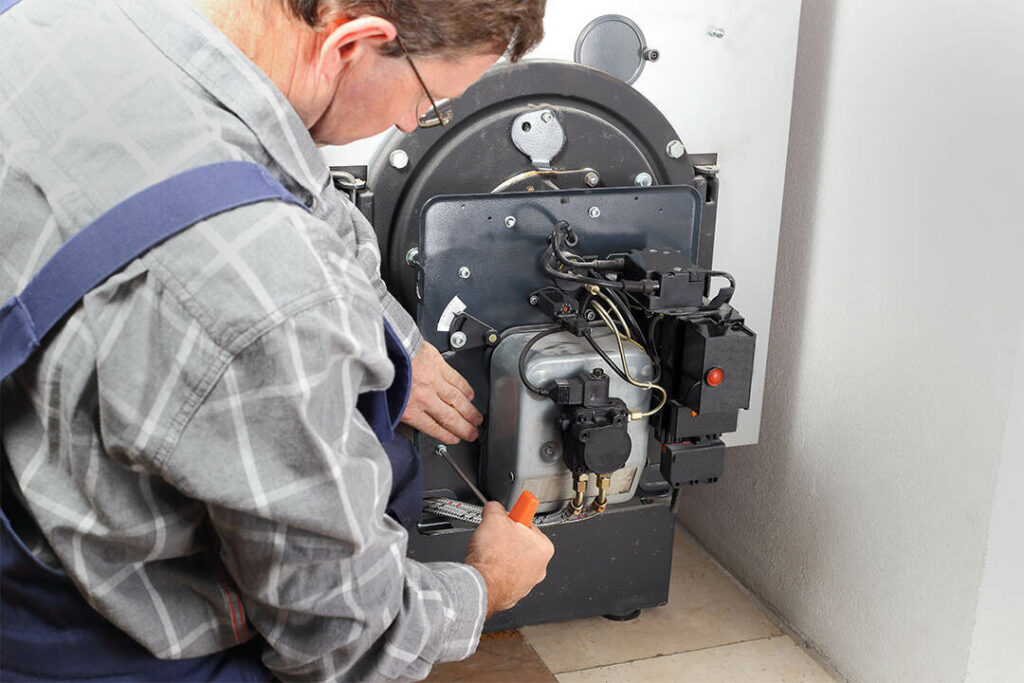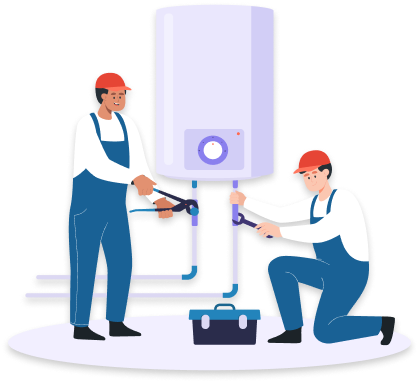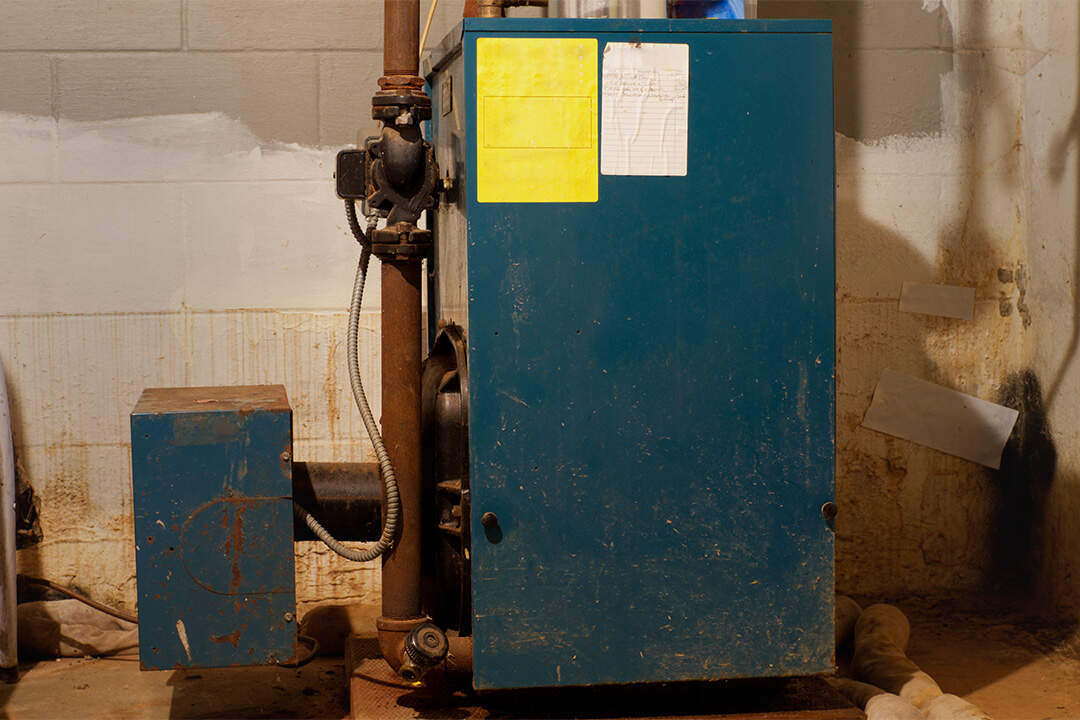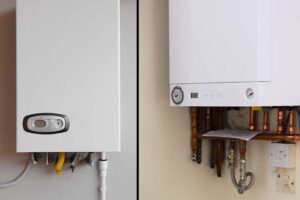Even though fewer people in the UK use oil boilers, about 5% still rely on them for heating. Oil boilers have downsides, like needing oil delivery and more maintenance. Also, they can be pricier to install, and they’re not eco-friendly. If you’re thinking of switching from an oil boiler to something else, there are lots of options available. These alternatives can improve your home and save money on energy bills. So, it’s worth checking them out!
What is an oil boiler?
An oil boiler is similar to a gas boiler, but instead of natural gas, it uses fuel oil to generate heat for your central heating system and domestic hot water. This makes them a popular choice for homes located off the gas network.
Oil boilers come with an oil storage tank, typically installed in your garden or nearby. The boiler feeds fuel from this tank to burn and create heat. However, this means you’ll need to arrange deliveries from a supplier whenever your oil runs low.
Oil regular boilers
The most common type of oil boiler is the regular oil boiler, also known as a conventional oil boiler. These are the old faithful you’ll often find in larger, older homes. Here’s how they work:
- Regular boilers use a separate system for heating your home and providing hot water.
- They rely on a cold water storage tank, usually located in the loft. This tank feeds water to the boiler.
- The boiler heats the water and circulates it through radiators to warm your house.
- They also heat water in a separate hot water cylinder, which provides hot water for taps and showers

Oil system boilers
Oil system boilers are a central heating system that burns oil to heat water for your home. They’re a good fit for places that already have an oil tank and are connected to the main water line. These boilers are different because they take their water directly from the mains water supply, eliminating the need for a separate cold water storage tank. This simplifies the setup compared to other boiler systems.
The boiler heats the mains water, and then stores the hot water in a separate hot water cylinder. This cylinder acts like a reservoir, keeping hot water on hand whenever you need it at taps or showers. The hot water from the cylinder is also used for central heating, typically circulated through radiators to warm your house.
Oil combi boilers
Oil combi boilers are all about convenience and saving space. They provide both central heating and hot water on demand, meaning they only fire up when you need a hot shower or to warm things up. This eliminates the need for that extra hot water cylinder that traditional oil boilers use, so there’s less clutter in your home. Think of it as an all-in-one system for your hot water and heating needs.
Now, oil combi boilers work very similarly to their natural gas counterparts. But here’s the catch: These are ideal for smaller homes. While they’re super efficient, they might struggle to keep a really big house toasty warm and with constant hot water. So, if you have a mansion, an oil combi boiler might not be the best choice. But if you have a smaller place, you can replace oil boiler with the combi option. Moreover, it’s a perfect space-saving solution!
Options for replacing an oil boiler
If you’re considering moving away from oil heating systems, there are several alternatives worth exploring. Let’s delve into some options for oil boiler replacement and help you make an informed decision about the best heating system for your home.
Gas boilers
Alright, so how do gas boilers compare to oil boilers? Well, they both work in a similar way. Soy you can replace oil boiler with this option easily. They burn fuel – gas in this case – to heat water that gets pumped through your radiators, keeping your house nice and toasty. Here’s the kicker though: gas is generally cheaper than oil, which is why most folks in the UK rely on gas for both heating and hot water.
So do you want to replace oil boiler? You might want to consider connecting to the gas grid if it’s available in your area. This network of pipes is basically a superhighway for natural gas, delivering it all over the UK. Now, the catch is that connecting to the grid can be expensive, especially if you live far out. But once you’re hooked up, gas boilers are way cheaper to run compared to oil or even electric ones. Another perk? Since gas comes straight to your house, you don’t need that bulky oil tank taking up space in your garden – another advantage over oil boilers. Plus, because gas is so popular, there’s always new and improved tech coming out to make it even more efficient.
LPG Boilers
Now, if you want the benefits of a gas boiler but your house isn’t connected to the gas grid? No worries! That’s where LPG boilers come in. So you can replace oil boiler easily with this option. LPG boilers work just like regular gas or oil boilers. They burn fuel to heat water that keeps your home warm and cozy. But here’s the twist: LPG boilers need a separate tank on your property to store the fuel, similar to oil boilers. This means you’ll need to have deliveries to top up the tank, just like heating oil.
The good news is that LPG boilers are generally cheaper to buy upfront compared to oil boilers. The bad news? The fuel itself can be a bit more expensive. And just like oil boilers, they require that bulky tank in your garden, which might not be the best fit for everyone.
Biomass boilers
Ever heard of heating your home with plants? That’s the idea behind biomass boilers! Biomass is basically organic stuff like wood chips, pellets, or even logs, all considered a sustainable way to heat your house. These boilers work similarly to oil boilers, but instead of burning oil, they use biomass to generate heat and hot water. The good news is you have options for what type of biomass to use. But here’s the catch: depending on what form you choose (pellets, chips, or logs), you might need to put in a bit more maintenance effort.
Now, biomass boilers are on the bigger side compared to gas or oil boilers, so they take up more space. On top of that, you’ll also need a dedicated storage area, like a proper wood shed, to keep your biomass fuel dry. This is super important because wet biomass burns poorly, making the whole system less efficient. Moreover, one of the biggest drawbacks of biomass boilers is the upfront cost. Installing one can set you back a fair whack, ranging from £4,000 to £8,000 – definitely a steeper price tag compared to other heating systems. So think twice before you replace oil boiler with a biomass one.
Air source heat pumps
Well, this is a cool option. These pumps basically act like super-efficient movers, taking heat from one place and bringing it to another place – in this case, your home! Heat pumps grab heat from either the ground or the air outside and then use it to warm up your house and provide hot water. The good news is they’re incredibly efficient, using minimal electricity to power the whole process. Plus, they’re eco-friendly since they’re not burning any fuel!
Now, there’s a bit of a catch. Heat pumps don’t always deliver the same super-consistent heat output that some other systems do. This means they work best when paired up with things like underfloor heating, which spreads the heat more evenly throughout your house. So again, you have the option to replace oil boiler and this time with an air-source heat pump.
Electric boilers
Hold on a second, forget everything you know about boilers that burn stuff! Electric boilers are a whole new ball game. So you can replace oil boiler with its electric counterpart. Instead of roaring flames and burning fuel, electric boilers use electricity to heat up water, keeping your house all warm and cosy. And because they’re electric, installation is a breeze.
No more fussing about laying expensive gas lines or installing those clunky vent pipes you see on traditional boilers – electric boilers keep things simple. But wait, there’s more! Electric boilers are also superstars for the eco-conscious homeowner. Since they don’t burn any fossil fuels, you’re basically giving the planet a high five every time you turn on the heat. Plus, if you’re not a huge fan of the whole gas network thing, electric boilers are completely independent – no gas needed, just pure electric power!
Now, here’s the thing: while electric boilers are amazing for the environment, they do have a bit of a downside. Running them can cost a bit more compared to other types of heating systems. Also, because they rely on electricity to heat water, they might not be the best choice for giant houses. A sprawling mansion might be too much for an electric boiler to handle, leaving you a little chilly in those far corners. So, electric boilers are perfect for smaller spaces and eco-friendly folks, but they might not be the ultimate solution for every single household. So do you want to replace you oil boiler with its electric counterpart?
Hybrid systems
Finally, you can also replace oil boiler with a hybrid system. These systems mix technologies for heating and hot water. They combine a heat pump or solar panels with an oil or gas boiler to suit different seasons and needs. When it’s warmer, the heat pump does well with warm air or ground. But in colder months, the boiler kicks in. Using less energy and gas at once, these systems save money and work better.

Need a new boiler
Get a New A-rated boiler with the Eco4 boiler Grant
Check Your Eligibility Now
Oil Boiler Replacement Options Comparison (UK Prices – May 2024)
| Feature | Gas Boilers | LPG Boilers | Biomass Boilers | Air Source Heat Pumps | Electric Boilers | Hybrid Systems |
| Replaces Oil Boiler | Yes | Yes | Possible | Yes | Yes | Yes |
| Fuel Type | Natural Gas (Grid Connection Required) | Liquefied Petroleum Gas (Tank Required) | Wood Pellets, Chips, Logs | Electricity | Electricity | Varies (Oil/Gas + Heat Pump/Solar) |
| Upfront Boiler Cost | £1,000 – £2,500 | £800 – £2,000 | £3,000 – £5,000 | £1,500 – £3,000 | £500 – £1,500 | Varies (depends on components) |
| Boiler Replacement Labour Cost | £500 – £1,000 | £500 – £1,000 | £750 – £1,250 | £1,000 – £1,500 | £400 – £800 | Varies (depends on complexity) |
| Gas Line Installation (if needed) | £500 – £2,000+ | Not Required | Not Required | Not Required | Not Required | Not Required |
| LPG Tank Installation (if needed) | £500 – £1,000 | Included | Not Required | Not Required | Not Required | Not Required |
| Fuel Storage Requirements | Not Required | Above-ground tank | Dedicated storage shed | Not Required | Not Required | Varies (may require oil tank removal) |
| Running Cost (per year) | £400 – £700 | £500 – £800 | £400 – £800 | £200 – £400 | £600 – £1,000 | Varies (depends on usage and components) |
| Maintenance Cost (per year) | £50 – £100 | £50 – £100 | £100 – £200 | £50 – £100 | £50 – £100 | Varies (depends on components) |
| Environmental Impact | Low (if replacing oil) | Moderate | High (Sustainable fuel, but requires storage) | Very Low | Low | Low (if using renewables) |
| Efficiency | High | High | Moderate | High | High | High (combines efficient technologies) |
| Suitability for Large Homes | Yes | Yes | Possible (Depends on boiler size) | Limited | Limited | Possible (Depends on system) |
Please note that these prices are based on estimates. They can vary depending on brand, model, location, and installer. So always get multiple quotes from qualified engineers before making a decision. Moreover, oil boiler replacement costs can vary significantly depending on the need to remove the old oil tank.
You Might be Eligible for a Free Oil Boiler Replacement Grant
Get the UK government-initiated ECO grants to support your outdated oil boiler replacement, making it easier to switch to an energy-efficient heating system with no upfront cost.
Bottom line
To wrap up, there are many options for heating and hot water systems. Each has its pros and cons. From old-school oil and gas boilers to new hybrid systems, homeowners have choices to fit their needs. Whether it’s the cost of gas boilers, the ease of oil boilers, or the efficiency of hybrid systems, there’s something for everyone. As technology gets better, homeowners should look into their options and pick what’s best for them. It’s all about staying cozy while being energy efficient and thinking about the environment too.







